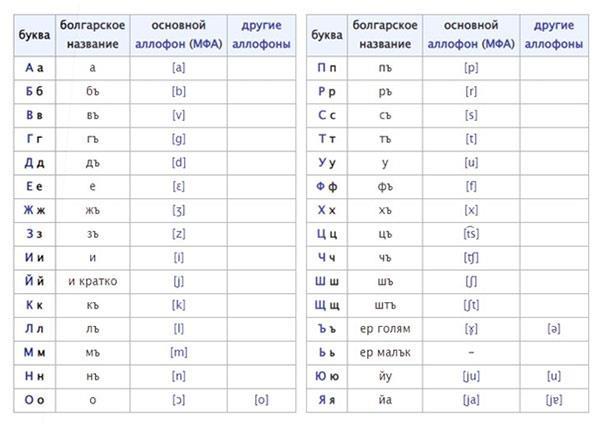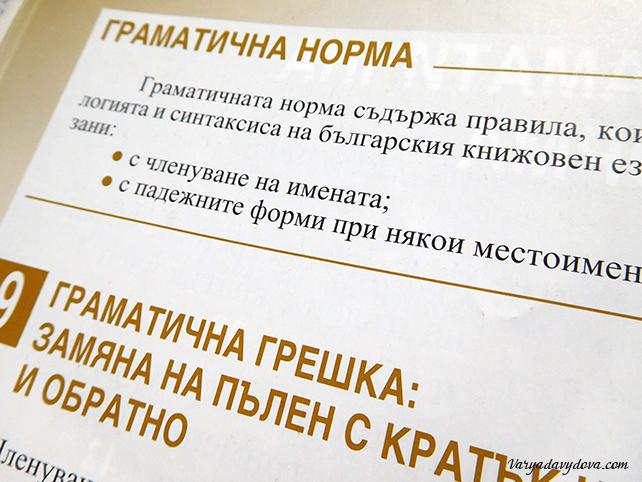The language of communication in Bulgaria: what you need to know about Bulgarian
Introduction Bulgaria is a country with a rich history and multilayered culture, where language plays a key role in the formation of national identity. The Bulgarian language, belonging to the group of South Slavic languages, not only serves as a means of communication for more than 7 million people, but is also the bearer of unique traditions and customs. In this article, we will examine the characteristics of the Bulgarian language, its grammatical structures, lexical features, and cultural aspects, which will help us better understand not only the language itself, but also its importance in the context of Bulgarian society. By learning about linguistic nuances and characteristics, readers will be able to take a more informed approach to learning Bulgarian language and culture.
Table of Contents
- Linguistic features of the Bulgarian language and its dialects
- Basic rules of communication and cultural nuances in Bulgaria
- The most common phrases and expressions for everyday communication
- Mistakes to avoid when communicating in Bulgarian
- Frequent questions and answers
- Conclusion

Linguistic features of the Bulgarian language and its dialects
Bulgarian language belongs to the group of South Slavic languages and is characterized by a special phonetics and grammar. It has several unique features, such as the presence of a definite article, which is placed after a noun. Among the peculiarities of the grammar can be highlighted:
- Verb forms that change in tense, person, and number;
- Using cases to indicate the role of words in a sentence;
- A variety of colloquial forms and parlor styles.
Within the Bulgarian language there are various dialects, which may differ slightly from each other. The main variants can be divided into:
| Dialect | Region | Examples of features |
|---|---|---|
| North | Northern Bulgaria | Simplified word endings; influence of Romanian. |
| Southern | Southern Bulgaria | Use of soft 'l', characteristic intonations. |
| Pirinean | Pirin region | Complex combinations of sounds; Greek influence. |
Thus, the Bulgarian language is rich in diversity and interesting features that make it unique not only for speakers, but also for learners. Understanding dialects and linguistic nuances will allow you to delve deeper into the cultural traditions and communication in Bulgaria.

Basic rules of communication and cultural nuances in Bulgaria
In Bulgaria, communication has its own specific features and cultural nuances that are worth considering when interacting with locals. First, an important element of communication is attention to business cards. Bulgarians appreciate it when you exchange business cards on both sides, but it is advisable to do so respectfully and in the right order - first offer your card and then accept theirs. It is also worth remembering to softnesses in communication: Bulgarians prefer a courteous and friendly tone, so harshness or directness may cause misunderstanding.
Another important aspect is gestures and body language. For example, in Bulgaria it is customary to tilt your head slightly in agreement and to deny by simply tilting your head forward and slightly sideways, which may be surprising to foreigners. It is also worth considering that shaking hands is enough when greeting, but don't forget to smile. It is important to respect personal space, but at the same time Bulgarians may seem more open than in some other cultures. Keep in mind that eye contact plays a big role - it shows sincerity and interest in the conversation.
The most common phrases and expressions for everyday communication
For ease of communication in Bulgaria, it is useful to learn basic phrases and expressions that will help you interact easily with the locals. Here is a list of the most commonly used phrases:
- Hello! - Greetings you!
- How's the stack? - How are you?
- Mola? - Please?
- Thanks! - Thank you!
- I'm sorry! - I'm sorry!
Knowing these expressions will not only help you build rapport quickly, but also create a pleasant social atmosphere. It is also useful to familiarize yourself with some basic phrases for ordering food or help:
| Phrase | Translation |
|---|---|
| Can I have a menu, please? | Can I have the menu, please? |
| Imam need from the aide. | I need help. |
| Where is the toaletnata? | Where's the restroom? |

Mistakes to avoid when communicating in Bulgarian
When communicating in Bulgarian, it is important to avoid common mistakes that can lead to misunderstandings. For example, foreigners often confuse pronouns and use them incorrectly. Usually, the use of pronouns in Bulgarian can be different from other languages, so it is important to understand the appropriate forms. It is also important to keep in mind correct use of verb endings errors in them can change the meaning of what is said. Try memorizing a few key rules and practicing using these grammatical elements.
In addition, nuances should be considered intonation and accents. In Bulgarian, some words have different meanings depending on how they are pronounced. It is therefore important to pay attention to tones and emotionsIt is also recommended that you avoid phrases that may seem rude or inappropriate. It is also advisable to avoid phrases that may seem rude or inappropriate. Simple but correct expressions will help create a more comfortable atmosphere for communication. Here are some expressions to remember:
| Expression | Translation |
|---|---|
| Hello! | Hello! |
| How's the stack? | How's it going? |
| Thanks! | Thank you! |
| Excuse me! | I'm sorry! |
Frequent questions and answers
Question: What is the main language in Bulgaria?
Answer: The main language of communication in Bulgaria is Bulgarian. It belongs to the group of South Slavic languages and uses the Cyrillic alphabet, which was developed in the IXth century.
Question: Are there any other common languages in Bulgaria?
Answer: Yes, minority languages such as Turkish and Romansh can also be found in Bulgaria, especially in regions with a multi-ethnic population. English is becoming increasingly popular, especially among young people and in tourist zones.
Question: What features does Bulgarian have?
Answer: Bulgarian has several unique features. For example, it does not use cases like many other Slavic languages, but it has a developed verb system, including various forms of tense and aspect. Also, Bulgarian has a system of definite and indefinite article.
Question: What are the rules of polite communication in Bulgaria?
Answer: It is important to be polite in Bulgaria. The most common form of address is "you", especially when meeting someone for the first time or when talking to older people. In an informal setting, it is possible to switch to "you" after one of the other people suggests it.
Q: Are there specific phrases or expressions worth knowing?
A: Yes, some popular phrases include "Hello" (Hello), "How are you?" (How are you?) and "Thanks" (Thank you). Also common in Bulgarian is the use of "Yes" and "Don't", with "Yes" being able to mean both "yes" and "let's".
Q: What advice would you give to those planning a trip to Bulgaria?
Answer: It is recommended to learn at least basic phrases in Bulgarian, as it is a sign of respect for the culture of the country. In addition, knowing some key words can make it easier to communicate with locals, as not all Bulgarians speak English.
Question: Where can I learn Bulgarian?
A: Bulgarian can be studied at language schools, universities and online platforms. It is also useful to practice the language with native speakers through language exchanges or conversation clubs.
Q: What is the role of language in Bulgarian culture?
Answer: Language is an important element of Bulgarian identity and culture. It reflects the country's rich history, literary heritage and traditions. Knowledge of the language helps to better understand Bulgarian culture, customs and the way of life of local people.
Conclusion
Understanding the Bulgarian language and how to communicate in Bulgaria is important for both tourists and those planning a long-term stay in the country. Mastering basic phrases and knowing the cultural nuances will help you establish a deeper and more trusting relationship with the locals. The Bulgarian language, like any other form of communication, reflects the rich history and traditions of this country. We hope that this information will be useful and will help you to navigate comfortably through the linguistic space of Bulgaria.






